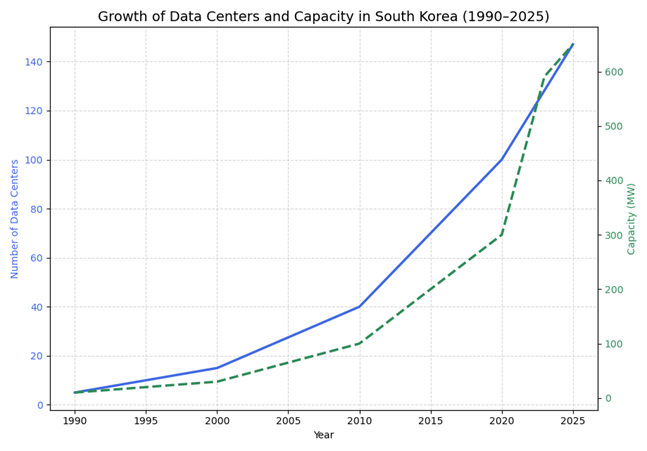The rise and rise of South Korea's data center industry
The what, where and why – for 2025

Landing at Incheon International Airport, just outside of Seoul, you can’t help but be impressed at the efficiency and modernity of South Korea, where technological advancement and digital innovation is proudly on display, throughout the nation. Similarly, the country's data center industry, a critical backbone of its digital economy, has seen remarkable growth and transformation over the past few decades. For those of you just joining us; here’s FM’s look into the history, current state, and future predictions for South Korea's data center sector.
Modest to robust
The journey of South Korea's data centers began in the late 1990s, coinciding with the country's rapid digitalization and the rise of the internet. Initially, data centers were modest facilities primarily serving local businesses. However, the early 2000s marked a significant shift as global tech giants recognized South Korea's potential. The deployment of the world's first commercial 5G network in 2019 further accelerated the demand for robust data infrastructure.
591 megawatts
As of 2025, South Korea boasts approximately 147 data centers, with the majority concentrated in the Greater Seoul area. These facilities range from small-scale operations to massive hyperscale data centers, reflecting the diverse needs of the market. The country's data center capacity reached 591 megawatts (MW) in 2023, making it the sixth-largest market in the Asia-Pacific region. According to the Ministry of Trade, Industry and Energy, the number of data centers in South Korea is forecast to more than quadruple to 637 by 2029.
Key players in the industry include domestic giants as well as international firms. These companies cater to a wide array of clients, from financial institutions and government agencies to media companies and e-commerce platforms.
Local advantage
South Korea's data center industry is uniquely influenced by its cultural and societal context. One could say the concept of "palli-palli" (빨리 빨리), meaning "hurry, hurry," epitomizes the nation's fast-paced approach to technological adoption and innovation. This cultural trait has driven rapid advancements and swift implementation of cutting-edge technologies in data centers, such as AI and automation.

Moreover, the dominance of large, Korean family-owned business conglomerates have shaped the industry. These conglomerates not only invest heavily in data infrastructure but also influence market dynamics through their extensive networks and resources.
Government initiatives and regulations
The South Korean government plays a pivotal role in the data center sector. Recent legislation aims to decentralize data centers from the congested Seoul metropolitan area to regional locations, addressing power supply challenges and promoting balanced regional development. Additionally, the government has introduced stringent regulations to ensure data security and disaster recovery, enhancing the resilience of digital infrastructure.
Fearless predictions
Observers are saying the future of South Korea's data center industry looks promising, with several trends and predictions likely shaping its trajectory:
- Expansion and Growth: The market is expected to grow at a compound annual growth rate (CAGR) of 7.06%, reaching an estimated USD 16.67 billion by 2032. This growth is driven by increasing demand for cloud services, big data analytics, and the integration of 5G technology.
- Green Data Centers: Sustainability is becoming a key focus, with initiatives to develop green data centers that utilize renewable energy sources. The government aims to achieve 20% renewable energy usage by 2030 and 35% by 2040.
- Edge Computing: The rise of edge computing is set to transform the industry, enabling low-latency operations and efficient data processing closer to end-users. This trend is particularly relevant for applications in IoT, autonomous vehicles, and smart cities.
- Increased Competition: The entry of new players, including international firms and real estate investors, is expected to intensify competition. This will likely lead to more innovative solutions and competitive pricing in the market.
Role to play
South Korea's data center industry is a testament to the country's technological prowess and forward-thinking approach. With a rich history, robust current landscape, and promising future, the sector is poised to continue its upward trajectory. The unique cultural influences and strong government support further underscore South Korea's position as a leader in the global digital economy.
As the world becomes increasingly digital, partly fueled by exponential growth in AI and IoT, South Korea's data centers will undoubtedly play a crucial role in shaping the future of technology and connectivity.
